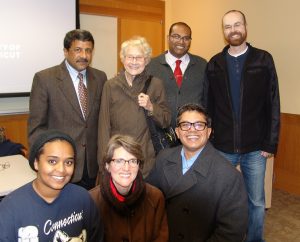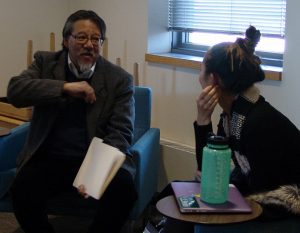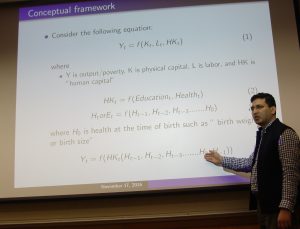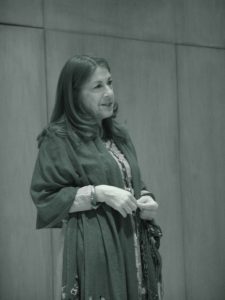For more than two decades, the Asian/Asian American Studies Institute (AAASI) at the University of Connecticut has offered a welcoming and lively forum to introduce and showcase a tremendous range of path-breaking, multidisciplinary scholarship, cultural productivity, and transnational activist practices to the university community and the general public.
2016 – 2017 GUEST LECTURE SERIES
Of the thirty-one (31) events that AAASI sponsored or co-sponsored during this academic year, more than a dozen (13 in all) were devoted to seminars, presentations and talkbacks with the authors or editors of recently published or about to be published books.
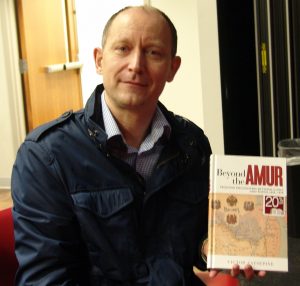 We are particularly proud and (unashamedly biased) to help launch AAASI core faculty member Victor Zatsepine’s BEYOND THE AMUR: Frontier Encounters between China and Russia, 1850-1930 (Univ. of British Columbia Press, 2017); his presentation “They Came from Everywhere: The People of the Amur” was held at the Barnes & Noble Bookstore at Storrs Center. We are also very pleased that AAASI and India Studies affiliated faculty Prakash Kashwan’s DEMOCRACY IN THE WOODS: Environmental Conservation and Social Justice in India, Tanzania, and Mexico (Oxford Univ. Press) had already sold out by January 2017, when he gave his talk in Oak Hall. And about the same time that AAASI and India Studies affiliated faculty, Patrick Hogan was being named Board of Trustees Distinguished Professor, his (Univ. of Nebraska Press, 2016) Imagining Kashmir: Emplotment and Colonialism was also the focus of a book discussion at UConn.
We are particularly proud and (unashamedly biased) to help launch AAASI core faculty member Victor Zatsepine’s BEYOND THE AMUR: Frontier Encounters between China and Russia, 1850-1930 (Univ. of British Columbia Press, 2017); his presentation “They Came from Everywhere: The People of the Amur” was held at the Barnes & Noble Bookstore at Storrs Center. We are also very pleased that AAASI and India Studies affiliated faculty Prakash Kashwan’s DEMOCRACY IN THE WOODS: Environmental Conservation and Social Justice in India, Tanzania, and Mexico (Oxford Univ. Press) had already sold out by January 2017, when he gave his talk in Oak Hall. And about the same time that AAASI and India Studies affiliated faculty, Patrick Hogan was being named Board of Trustees Distinguished Professor, his (Univ. of Nebraska Press, 2016) Imagining Kashmir: Emplotment and Colonialism was also the focus of a book discussion at UConn.
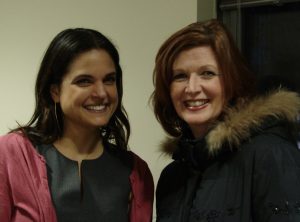 AAASI external affiliate faculty gave lectures based on their recently published books: UMASS Amherst faculty in the Department of English Asha Nadkarni spoke to a capacity crowd (thanks to WGSS faculty and students in attendance) on “Eugenic Feminism: Reproductive Nationalism in the U.S. and India (Univ. of Minnesota Press); and ECSU faculty in History Bradley Camp Davis delivered “Violence and Resistance: Imperial Bandits and Echoes of Oral Tradition in the Uplands” (Univ. of Washington Press).
AAASI external affiliate faculty gave lectures based on their recently published books: UMASS Amherst faculty in the Department of English Asha Nadkarni spoke to a capacity crowd (thanks to WGSS faculty and students in attendance) on “Eugenic Feminism: Reproductive Nationalism in the U.S. and India (Univ. of Minnesota Press); and ECSU faculty in History Bradley Camp Davis delivered “Violence and Resistance: Imperial Bandits and Echoes of Oral Tradition in the Uplands” (Univ. of Washington Press).
Additional book-based readings and talks by authors included Matthew Salesses’ The Hundred-Year Flood: A Novel; Madeline Hsu’s “Cold War Era Chinese Immigration to the United States”; and Anirudh Krishna’s “One Illness Away and the Quest for Solutions to Poverty,” which was sponsored by India Studies and standing room only in spite of the snowstorm that brought back memories of his time as a doctoral student in upstate New York.
The Institute also hosted seminars devoted to developments in the field and critically examining pressing issues of significance: Brian Russell Roberts previewed the emergent scholarship that make up the edited volume (with Michelle Ann Stephens) from Duke University Press (June 2017) Archipelagic American Studies; Eboo Patel’s Sacred Ground: Pluralism, Prejudice, and the Promise of America was the year’s UConn Reads selection, providing the basis for the deliberative and lively dialog between faculty, staff and students across diverse faith traditions; the Manisha Desai-moderated panel/seminar entitled “Sex, Terror and the Nation State” featured activist artist/critic/scholar(s) Ali Asgar, Kaustav Bakshi, and AAASI affiliated faculty Debanuj DasGupta; and the double-book seminar on Rightlessness: Testimony and Redress in U.S. Prison Camps Since World War II by A. Naomi Paik and Unsettled: Cambodian Refugees in the New York City Hyperghetto by Eric Tang capped the Spring Semester.
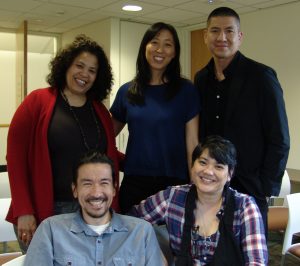 In collaboration with the Asian American Cultural Center to mark Asian American Heritage Observance at UConn, AAASI co-sponsored award-winning Gene Luen Yang’s author talk/discussion (with Reading Without Walls) of American Born Chinese; the meeting of the Pacific New England Consortium; a pre-election “Trump v. Clinton” panel discussion (with El Instituto) on Race and the Future of American Politics; and the Keynote by Janelle Wong on Asian American Politics. In the Spring, the Center co-hosted Greg Robinson’s important and timely public lecture “Reflections on Executive Order 9066 at 75.”
In collaboration with the Asian American Cultural Center to mark Asian American Heritage Observance at UConn, AAASI co-sponsored award-winning Gene Luen Yang’s author talk/discussion (with Reading Without Walls) of American Born Chinese; the meeting of the Pacific New England Consortium; a pre-election “Trump v. Clinton” panel discussion (with El Instituto) on Race and the Future of American Politics; and the Keynote by Janelle Wong on Asian American Politics. In the Spring, the Center co-hosted Greg Robinson’s important and timely public lecture “Reflections on Executive Order 9066 at 75.”
Additional GLS programs that presented newer scholarship in Asian and Asian American Studies brought K. Scott Wong (pictured below with student) to UConn to explore “The Good Asian in the Good War”.
AAASI external affiliate faculty Ivan V. Small of Central Connecticut State University shared his research on “The Affective, Economic and Symbolic Value of Driving Motorcycles and Autos in Southeast Asia” in the Stern Lounge. Also notable was the Graphic Narrative Workshop organized by AAASI director Cathy Schlund-Vials who is also co-director of UGNI, and the year-long series of Political Theory Workshops organized by AAASI core faculty member Fred Lee with UConn Humanities Institute support, which featured AAASI affiliate faculty Peter Zarrow’s work in progress “From Trotskyism to Proletarian Democracy: China, 1930s”.
Rounding out this tremendously productive year, the Institute’s robust engagement of India Studies invited lectures and presentations continues its forward momentum. Beginning with Sharmila Purkayastha’s “Women’s Prison Writings in Bengal and the Americas”, followed by the Kathryn Myers curated exhibition “Traversing Traditions of India” at the Charter Oak Cultural Center, with related talks by Indian contemporary artist Kanchan Chander and art historian John Bowles who spoke on Indian folk and tribal art, and the above-mentioned talk by Anirudh Krishna. The Fall Semester closed with Santosh Kumar (pictured below at whiteboard) elaborating on the conceptual framework for his cross-disciplinary (Health Economics and Human Rights) research on “The Effect of Birthweight on Cognitive Development: New Evidence from India” that was attended by faculty members and clinicians from UConn’s School of Nursing.
The Annual Radha Devi Joshi Lecture that was held in the Spring Semester featured Amrita Basu, Paino Professor of Political Science & Women’s and Gender Studies at Amherst College, who delivered “Women’s Dynastic Politics, Gender Inequality and Democracy in India.” In addition to the book seminars featuring Prakash Kashwan and Patrick Hogan, India Studies also sponsored the following lectures: “High-Tech Leaps, Forsaken Lives: Politics and Policies of E-Waste Management” and “Photography and Environmental Activism” – by Ravi Agarwal; and “How Partisan is Political Brokerage in India?” by Simon Chauchard of Dartmouth College.
Closing out the academic year, India Studies sponsored a major workshop convened by AAASI core faculty Meina Cai and affiliate faculty Prakash Kashwan on “The Politics of Land and the Polemics of Urbanization” that highlights the centrality of land with regard to economic development, food security, and social stability, providing a uniquely valuable window to examine the interaction between state actors and between the state and society in the process of economic development.
